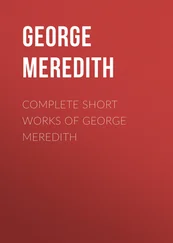George Meredith - Rhoda Fleming. Complete
Здесь есть возможность читать онлайн «George Meredith - Rhoda Fleming. Complete» — ознакомительный отрывок электронной книги совершенно бесплатно, а после прочтения отрывка купить полную версию. В некоторых случаях можно слушать аудио, скачать через торрент в формате fb2 и присутствует краткое содержание. Жанр: foreign_prose, literature_19, foreign_antique, на английском языке. Описание произведения, (предисловие) а так же отзывы посетителей доступны на портале библиотеки ЛибКат.
- Название:Rhoda Fleming. Complete
- Автор:
- Жанр:
- Год:неизвестен
- ISBN:нет данных
- Рейтинг книги:3 / 5. Голосов: 1
-
Избранное:Добавить в избранное
- Отзывы:
-
Ваша оценка:
- 60
- 1
- 2
- 3
- 4
- 5
Rhoda Fleming. Complete: краткое содержание, описание и аннотация
Предлагаем к чтению аннотацию, описание, краткое содержание или предисловие (зависит от того, что написал сам автор книги «Rhoda Fleming. Complete»). Если вы не нашли необходимую информацию о книге — напишите в комментариях, мы постараемся отыскать её.
Rhoda Fleming. Complete — читать онлайн ознакомительный отрывок
Ниже представлен текст книги, разбитый по страницам. Система сохранения места последней прочитанной страницы, позволяет с удобством читать онлайн бесплатно книгу «Rhoda Fleming. Complete», без необходимости каждый раз заново искать на чём Вы остановились. Поставьте закладку, и сможете в любой момент перейти на страницу, на которой закончили чтение.
Интервал:
Закладка:
Not only had Algernon never failed to dine every day of his life: he had no recollection of having ever dined without drinking wine. His conception did not embrace the idea of a dinner lacking wine. Possibly he had some embodied understanding that wine did not fall to the lot of every fellow upon earth: he had heard of gullets unrefreshed even by beer: but at any rate he himself was accustomed to better things, and he did not choose to excavate facts from the mass of his knowledge in order to reconcile himself to the miserable chop he saw for his dinner in the distance—a spot of meat in the arctic circle of a plate, not shone upon by any rosy-warming sun of a decanter!
But metaphorical language, though nothing other will convey the extremity of his misery, or the form of his thoughts, must be put aside.
“Egad, and every friend I have is out of town!” he exclaimed, quite willing to think it part of the plot.
He stuck his hands in his pockets, and felt vagabond-like and reckless. The streets were revelling in their winter muck. The carriages rolling by insulted him with their display of wealth.
He had democratic sentiments regarding them. Oh for a horse upon the boundless plains! he sighed to his heart. He remembered bitterly how he had that day ridden his stool at the bank, dreaming of his wilds, where bailiff never ran, nor duns obscured the firmament.
And then there were theatres here—huge extravagant places! Algernon went over to an entrance of one, to amuse his mind, cynically criticizing the bill. A play was going forward within, that enjoyed great popular esteem, “The Holly Berries.” Seeing that the pit was crammed, Algernon made application to learn the state of the boxes, but hearing that one box was empty, he lost his interest in the performance.
As he was strolling forth, his attention was taken by a noise at the pit-doors, which swung open, and out tumbled a tough little old man with a younger one grasping his coat-collar, who proclaimed that he would sicken him of pushing past him at the end of every act.
“You’re precious fond of plays,” sneered the junior.
“I’m fond of everything I pay for, young fellow,” replied the shaken senior; “and that’s a bit of enjoyment you’ve got to learn—ain’t it?”
“Well, don’t you knock by me again, that’s all,” cried the choleric youth.
“You don’t think I’m likely to stop in your company, do you?”
“Whose expense have you been drinking at?”
“My country’s, young fellow; and mind you don’t soon feed at the table. Let me go.”
Algernon’s hunger was appeased by the prospect of some excitement, and seeing a vicious shake administered to the old man by the young one, he cried, “Hands off!” and undertook policeman’s duty; but as he was not in blue, his authoritative mandate obtained no respect until he had interposed his fist.
When he had done so, he recognized the porter at Boyne’s Bank, whose enemy retired upon the threat that there should be no more pushing past him to get back to seats for the next act.
“I paid,” said Anthony; “and you’re a ticketer, and you ticketers sha’ n’t stop me. I’m worth a thousand of you. Holloa, sir,” he cried to Algernon; “I didn’t know you. I’m much obliged. These chaps get tickets given ‘m, and grow as cocky in a theatre as men who pay. He never had such wine in him as I’ve got. That I’d swear. Ha! ha! I come out for an airing after every act, and there’s a whole pitfall of ticketers yelling and tearing, and I chaff my way through and back clean as a red-hot poker.”
Anthony laughed, and rolled somewhat as he laughed.
“Come along, sir, into the street,” he said, boring on to the pavement. “It’s after office hours. And, ha! ha! what do you think? There’s old farmer in there, afraid to move off his seat, and the girl with him, sticking to him tight, and a good girl too. She thinks we’ve had too much. We been to the Docks, wine-tasting: Port—Sherry: Sherry—Port! and, ha! ha! ‘what a lot of wine!’ says farmer, never thinking how much he’s taking on board. ‘I guessed it was night,’ says farmer, as we got into the air, and to see him go on blinking, and stumbling, and saying to me, ‘You stand wine, brother Tony!’ I’m blest if I ain’t bottled laughter. So, says I, ‘come and see “The Holly Berries,” brother William John; it’s the best play in London, and a suitable winter piece.’ ‘Is there a rascal hanged in the piece?’ says he. ‘Oh, yes!’ I let him fancy there was, and he—ha! ha! old farmer’s sticking to his seat, solemn as a judge, waiting for the gallows to come on the stage.”
A thought quickened Algernon’s spirit. It was a notorious secret among the young gentlemen who assisted in maintaining the prosperity of Boyne’s Bank, that the old porter—the “Old Ant,” as he was called—possessed money, and had no objection to put out small sums for a certain interest. Algernon mentioned casually that he had left his purse at home; and “by the way,” said he, “have you got a few sovereigns in your pocket?”
“What! and come through that crush, sir?” Anthony negatived the question decisively with a reference to his general knowingness.
Algernon pressed him; saying at last, “Well, have you got one?”
“I don’t think I’ve been such a fool,” said Anthony, feeling slowly about his person, and muttering as to the changes that might possibly have been produced in him by the Docks.
“Confound it, I haven’t dined!” exclaimed Algernon, to hasten his proceedings; but at this, Anthony eyed him queerly. “What have you been about then, sir?”
“Don’t you see I’m in evening dress? I had an appointment to dine with a friend. He didn’t keep it. I find I’ve left my purse in my other clothes.”
“That’s a bad habit, sir,” was Anthony’s comment. “You don’t care much for your purse.”
“Much for my purse, be hanged!” interjected Algernon.
“You’d have felt it, or you’d have heard it, if there ‘d been any weight in it,” Anthony remarked.
“How can you hear paper?”
“Oh, paper’s another thing. You keep paper in your mind, don’t you—eh? Forget pound notes? Leave pound notes in a purse? And you Sir William’s nephew, sir, who’d let you bank with him and put down everything in a book, so that you couldn’t forget, or if you did, he’d remember for you; and you might change your clothes as often as not, and no fear of your losing a penny.”
Algernon shrugged disgustedly, and was giving the old man up as a bad business, when Anthony altered his manner. “Oh! well, sir, I don’t mind letting you have what I’ve got. I’m out for fun. Bother affairs!”
The sum of twenty shillings was handed to Algernon, after he had submitted to the indignity of going into a public-house, and writing his I.O.U. for twenty-three to Anthony Hackbut, which included interest. Algernon remonstrated against so needless a formality; but Anthony put the startling supposition to him, that he might die that night. He signed the document, and was soon feeding and drinking his wine. This being accomplished, he took some hasty puffs of tobacco, and returned to the theatre, in the hope that the dark girl Rhoda was to be seen there; for now that he had dined, Anthony’s communication with regard to the farmer and his daughter became his uppermost thought, and a young man’s uppermost thought is usually the propelling engine to his actions.
By good chance, and the aid of a fee, he obtained a front seat, commanding an excellent side-view of the pit, which sat wrapt in contemplation of a Christmas scene snow, ice, bare twigs, a desolate house, and a woman shivering—one of man’s victims.
It is a good public, that of Britain, and will bear anything, so long as villany is punished, of which there was ripe promise in the oracular utterances of a rolling, stout, stage-sailor, whose nose, to say nothing of his frankness on the subject, proclaimed him his own worst enemy, and whose joke, by dint of repetition, had almost become the joke of the audience too; for whenever he appeared, there was agitation in pit and gallery, which subsided only on his jovial thundering of the familiar sentence; whereupon laughter ensued, and a quieting hum of satisfaction.
Читать дальшеИнтервал:
Закладка:
Похожие книги на «Rhoda Fleming. Complete»
Представляем Вашему вниманию похожие книги на «Rhoda Fleming. Complete» списком для выбора. Мы отобрали схожую по названию и смыслу литературу в надежде предоставить читателям больше вариантов отыскать новые, интересные, ещё непрочитанные произведения.
Обсуждение, отзывы о книге «Rhoda Fleming. Complete» и просто собственные мнения читателей. Оставьте ваши комментарии, напишите, что Вы думаете о произведении, его смысле или главных героях. Укажите что конкретно понравилось, а что нет, и почему Вы так считаете.












